At the beginning of this year, "vibe coding" gradually became one of the popular discussion topics in the AI community. In the cryptocurrency world, as Bitcoin remains strong, the desire for altcoin season is also growing stronger. The AI track in the crypto space has gone through two waves of excitement with AI memes and AI agents, shifting from "meme trading" to "framework trading," and the exploration of new narratives in AI has never stopped.
Could "vibe coding" be a breakthrough narrative for the AI track in the crypto space?
What is vibe coding?
This concept was proposed by OpenAI's former co-founder Andrej Karpathy in a tweet on February 3 of this year:
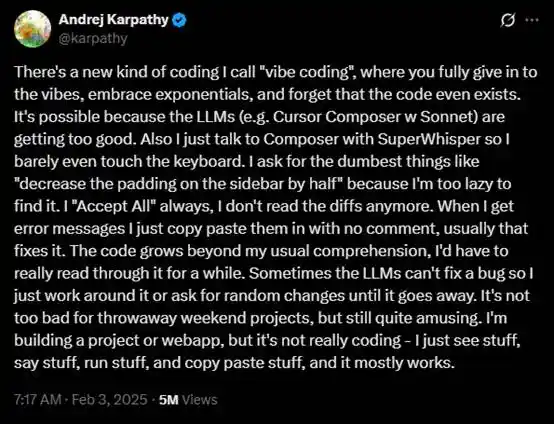
Andrej Karpathy described "vibe coding" as follows:
I call this new programming approach "vibe coding": being completely immersed in the atmosphere, letting go of oneself, and even forgetting that I am writing code. This is possible because today's large language models (like Cursor Composer paired with Sonnet) are powerful beyond imagination.
I hardly type anymore; I directly converse with the Composer using SuperWhisper. I make extremely casual, lazy requests, like "reduce the sidebar's padding by half," because I'm too lazy to locate where to change it myself. I tend to just "accept all" AI-generated modifications without even looking at the diff. When I encounter error messages, I simply copy and paste them to the AI without writing any comments, and in most cases, it can fix them.
The amount of code has grown so large that it exceeds what I can quickly understand, requiring a lot of time to fully comprehend. Sometimes, when the AI can't solve a bug, I just bypass it or repeatedly change something randomly until the problem disappears. For projects I casually work on over the weekend, this approach is perfectly fine and even quite interesting.
I can say that I am indeed working on a project or web application, but it no longer resembles traditional "programming": I just see the problem, state the requirements, run the results, and copy and paste, allowing most functionalities to run.
In short, "vibe coding" is a development method that minimizes the technical barriers required to create applications. The programming language you use is simply the language you communicate in daily. Tell the AI what you need, and it will whip up a usable application for you.
Existing vibe coding projects in the crypto space
dev.fun
This platform officially launched in January of this year and received investment from Colosseum in March.
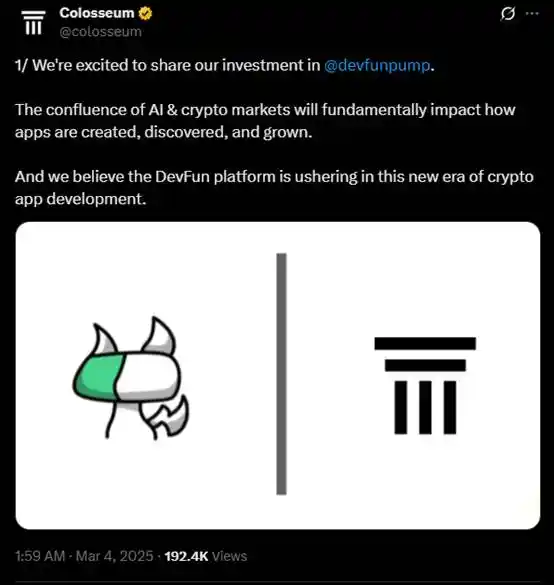
You only need to describe your needs in spoken language on this platform, and it will automatically start writing code, presenting a usable app. For example, I asked the platform to help me create a jumping game, and the initial result was as follows:
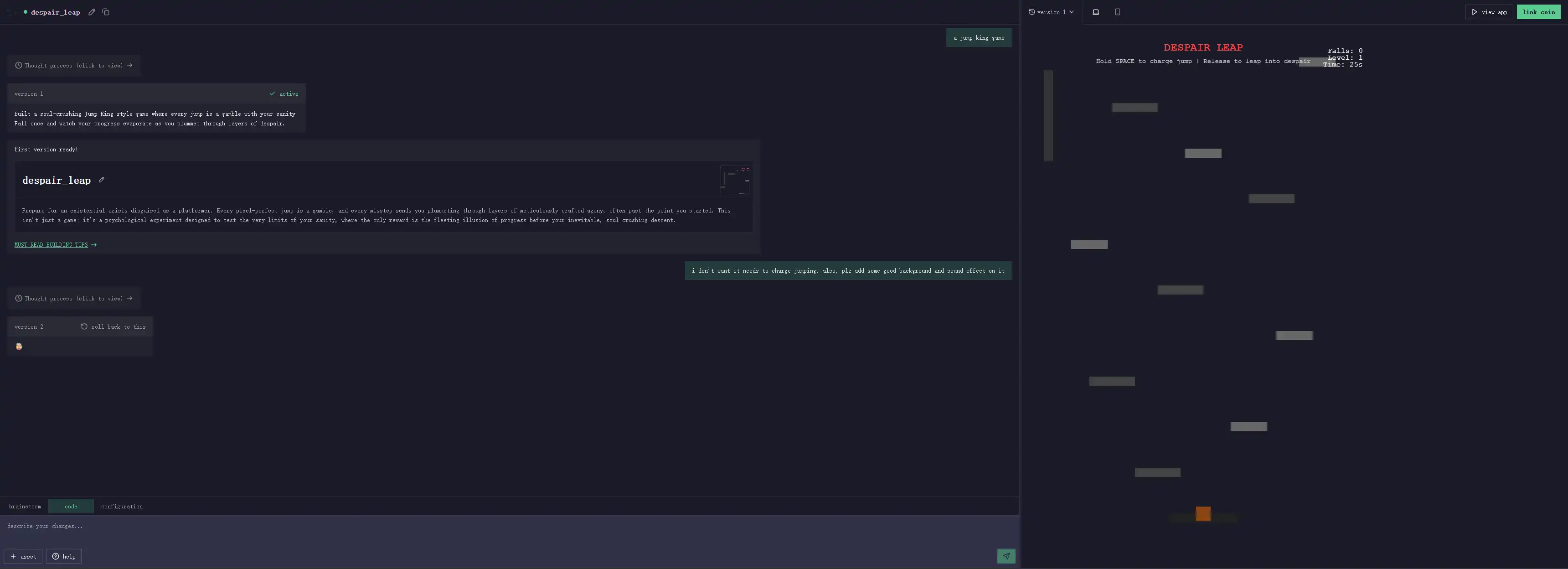
After paying 0.01 SOL, I requested modifications to this initial version, asking for three things: adding a background, adding sound effects, and removing the charge jump mechanism, all of which were fulfilled.
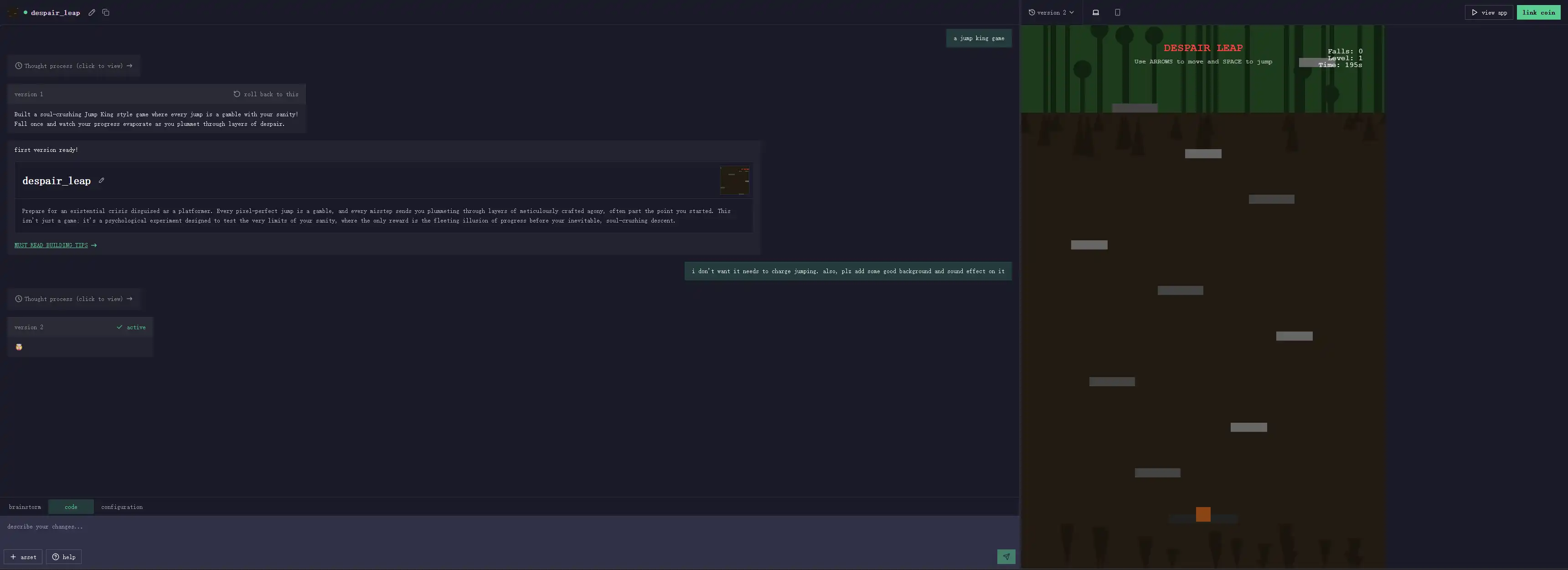
Once the app has been repeatedly modified and polished to satisfaction, you can choose to launch a token for the app itself on pump.fun or associate it with a specific token on pump.fun.
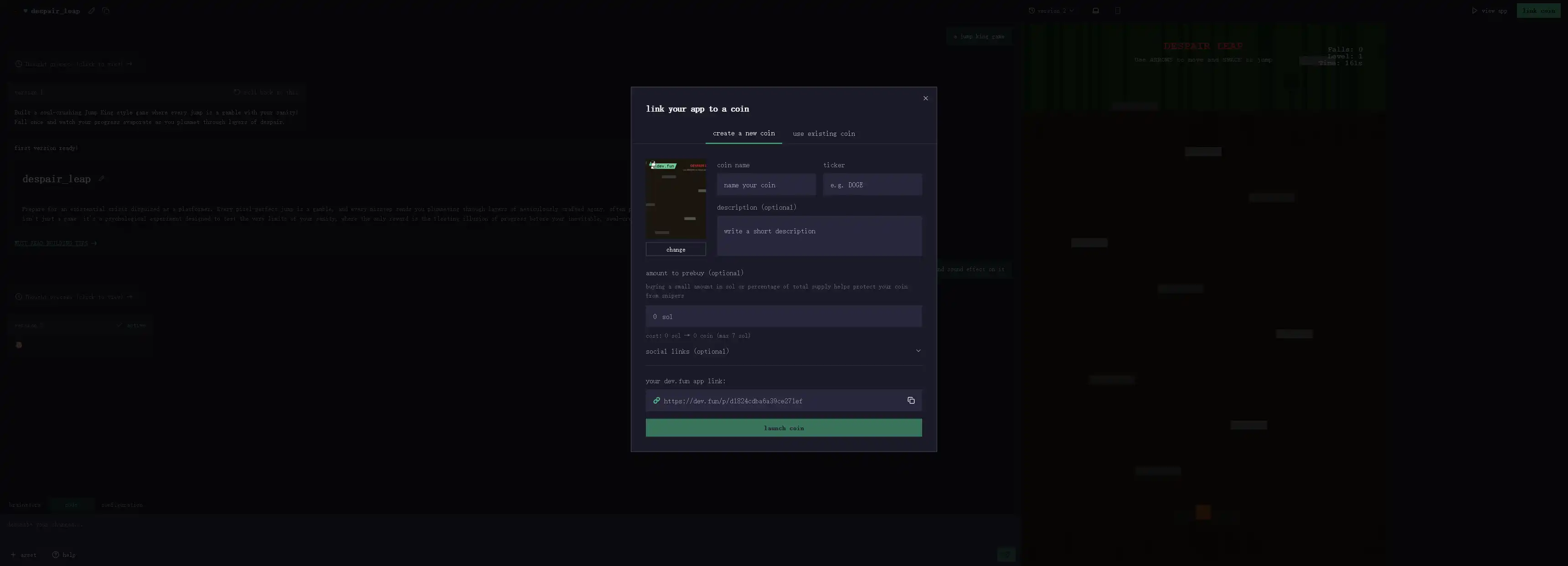
This mechanism means that applications produced using dev.fun can capture value as individuals and can also create content or functionalities around a specific token, potentially leading to the emergence of "coding guilds." For instance, the currently highest market cap token on the platform, $buidl, is a DAO + project incubator, and relatively successful projects that have emerged from dev.fun, such as $ZALA and $dab, were all incubated by buidlDAO.
The current market cap of $buidl is just under 3 million dollars, making it the top token on dev.fun. Besides its past successful incubations, the close interaction between the dev.fun team and the project, with team members frequently mentioning it in their tweets, has contributed to this status. Given this incubator positioning, the market views it as a "semi-official" token. (Note: $buidl is not the official token of dev.fun, and dev.fun currently has no official token.)
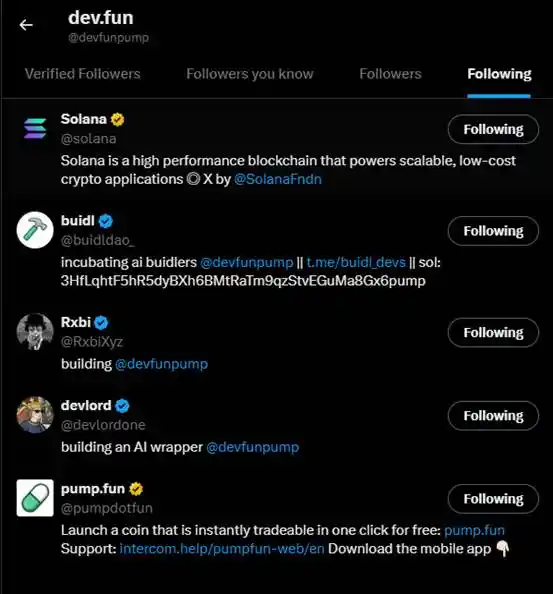
buildDAO is one of the only 5 accounts followed by dev.fun's official Twitter
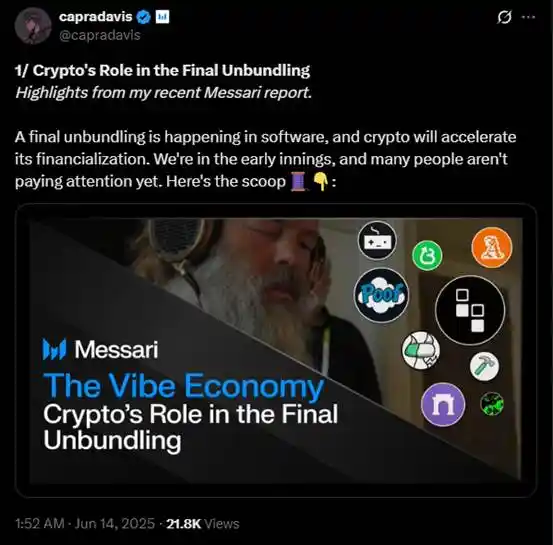
buildDAO's logo also appeared on the cover of a Messari report
Another impressive aspect of $buidl is that they created a Twitter bot, @buidldev, which allows users to simply @ this bot on Twitter and describe their application needs, and the bot will automatically create an application on dev.fun. While other platforms like Ohara also have similar features, this one is officially developed. So this opens up possibilities for everyone…
Returning to dev.fun itself, the people at Colosseum have been quite supportive of dev.fun. For example, @crabbylions initiated the $RICK hackathon on dev.fun:
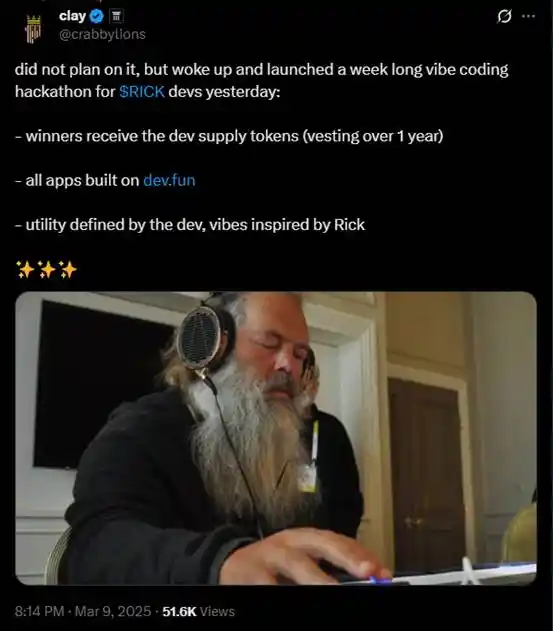
Even recently, there have been many tweets supporting dev.fun:

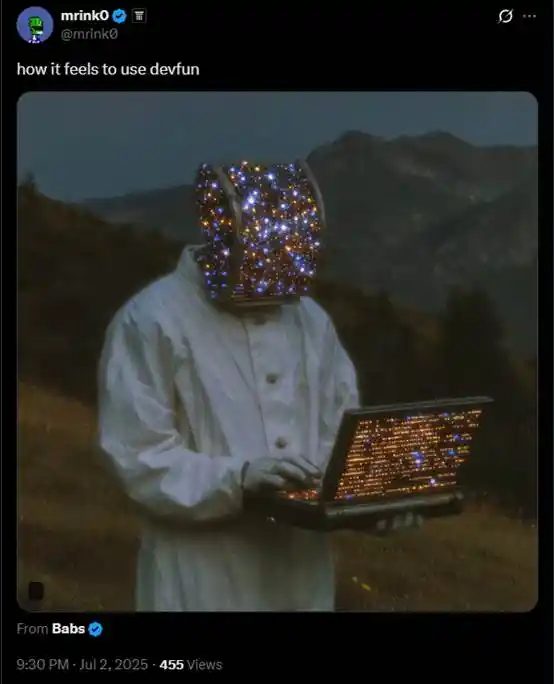
Currently, there are over 21,800 applications on dev.fun. Last month, dev.fun updated its support for building dApps on the Solana chain:
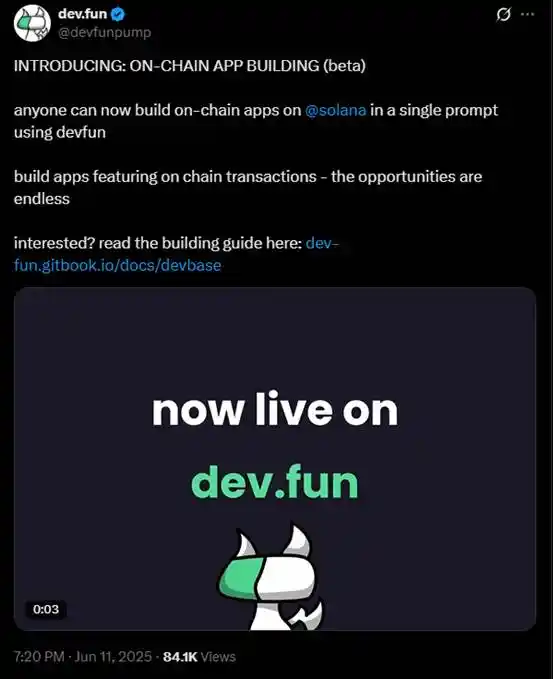
poof.new
poof.new has received support from AllianceDAO. Compared to dev.fun, it does not have a token tied to projects and focuses solely on building dApps on Solana.
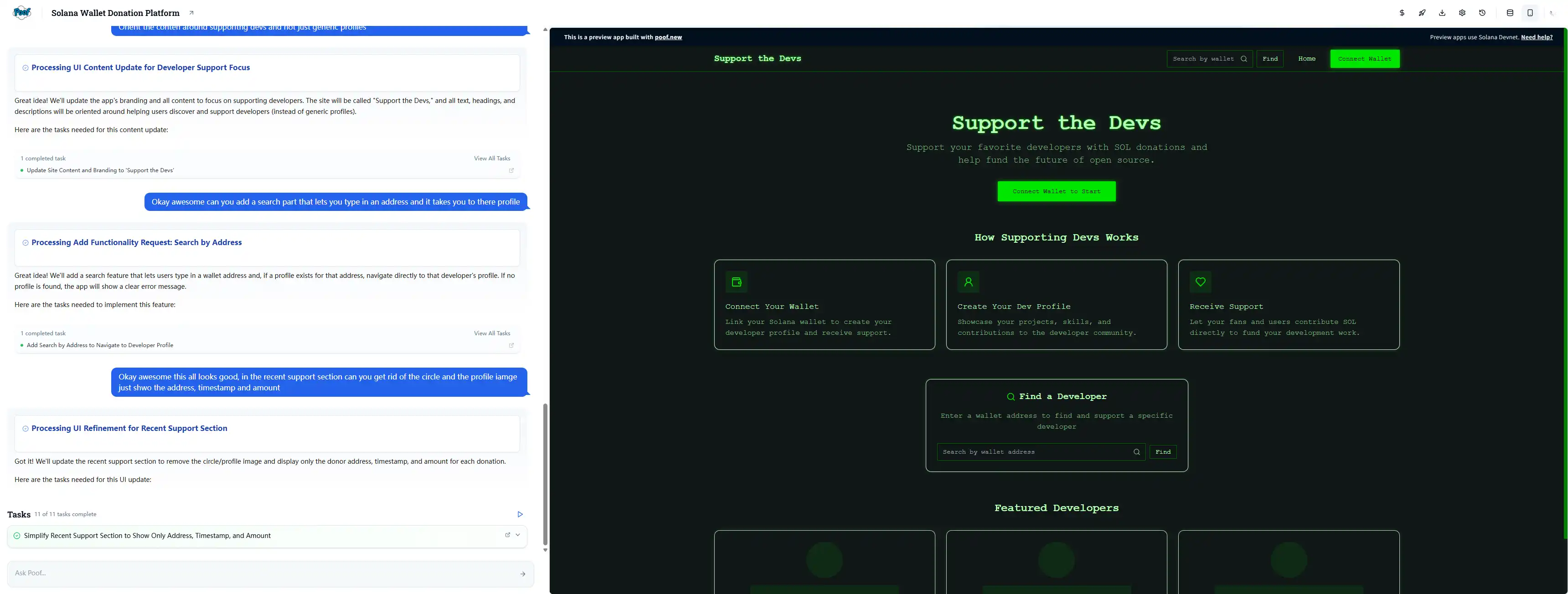
Example of a Solana tipping platform on poof.new
Remix
Remix has received support from Base, Lemniscap, and Variant Fund. This is a vibe coding platform focused on games, where users can either describe their needs from scratch to create games directly on the platform or mix their games with those from other developers to create a more innovative version.
To date, Remix has over 500,000 players, more than 800 games, and over 18 million play sessions.
In terms of application discovery, Remix also stands out, as its homepage resembles a game marketplace.
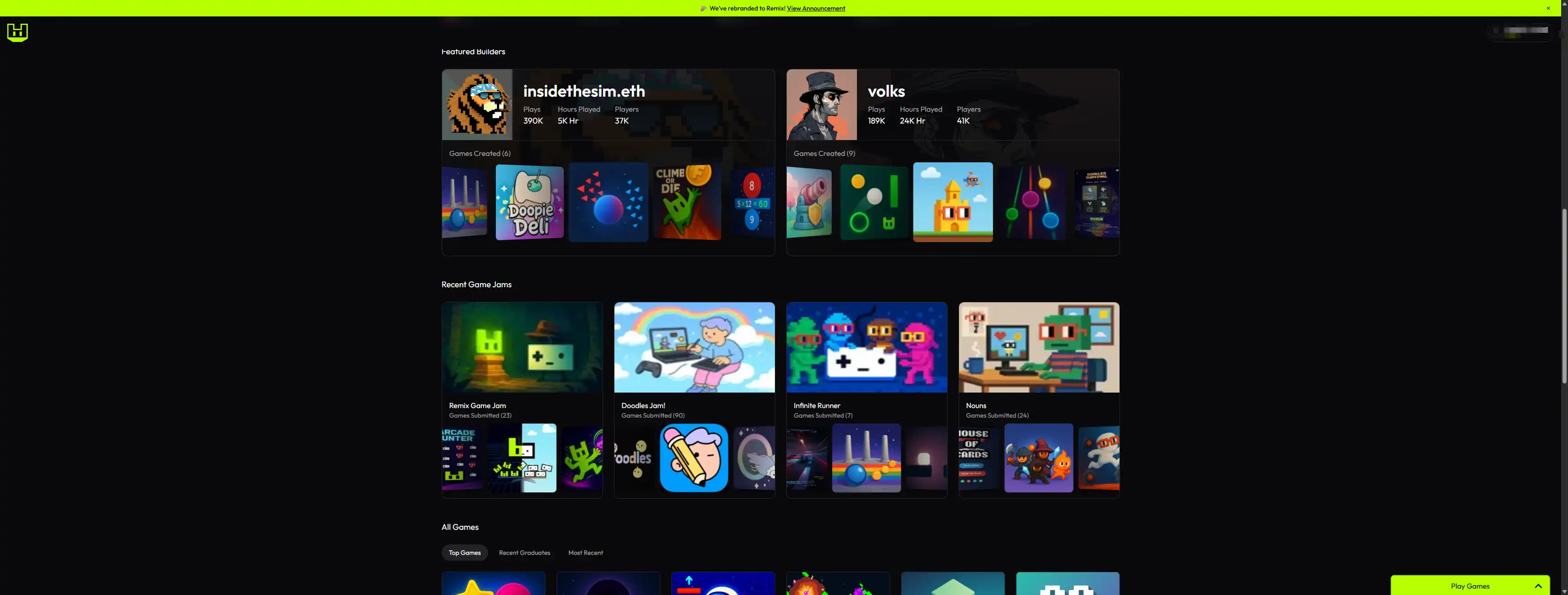
Additionally, it is worth mentioning that Remix has a points system related to airdrops, where actions like creating games, playing games, and rating games earn Remix points.
Ohara
This platform is generally similar to dev.fun, and the apps created also have tokens, but it does not link to pump.fun like dev.fun; instead, it has its own built-in launchpad. Moreover, this platform is built on Base.

Currently, the highest market cap token on the platform is a meme coin called $HELLOWORLD, which is essentially a button that redirects to Ohara's homepage. This is also the platform's first token, with a current market cap of about 2.6 million dollars.
Alchemist AI
This platform has already issued the token $ALCH. Compared to the projects mentioned above, I believe its biggest difference lies in the overall design of the economic mechanism. Creating apps on Alchemist AI requires the use of $ALCH, and it also has a built-in application trading market where $ALCH can be used for buying and selling.
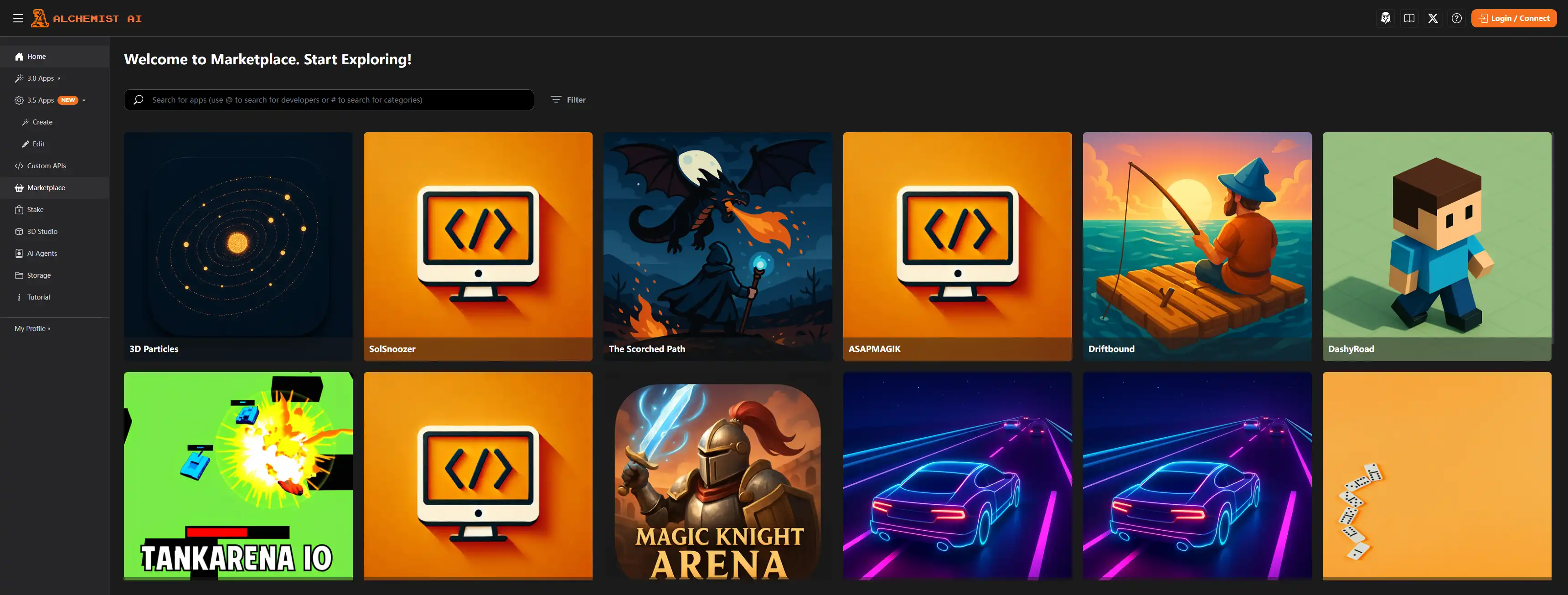
I personally think this approach is relatively traditional and not well-suited for crypto, which I will continue to discuss below.
Adaptation Points of Vibe Coding Platforms in the Crypto Space
From the projects mentioned above, we can see that all these vibe coding platforms primarily produce lightweight applications. Their advantage is that if I have a sudden, not-too-complex idea today, I can immediately implement it and deliver it to the market without getting bogged down in how to achieve it; I just need to focus my time and energy on the idea.
In fact, vibe coding in the developer community is often used to implement MVPs (Minimum Viable Products) or as programming assistance (refining or modifying AI-generated code results to improve development efficiency). When it comes to complex ideas with hard requirements regarding performance and security, the current level of technology still cannot allow AI to solve everything with a single command.
For developers, vibe coding may currently only enhance work efficiency, but in the crypto space, it represents another liberation at the "content creation" level. Yes, if we don't view vibe coding as program creation but rather as a form of content creation, its potential in the crypto space becomes significant.
The meme coin sector is continuously evolving, and each bull market almost sees an increase in the productivity of meme coins themselves. For instance, during the last meme coin bull market, pump.fun allowed everyone to issue their own meme coins at almost zero cost. People have become accustomed to this, but back in 2023, I wrote an article titled "Practical Test: How Much Does It Cost to Issue a Meme on Base?" At that time, creating meme coins still had its barriers.
The capabilities of vibe coding platforms can significantly lower the barriers to content creation. Whether you want to create a meme website or build a data dashboard around a specific token, it has become very easy. Therefore, the potential of vibe coding platforms does not lie in "being able to create apps with impressive practical utility," which is absolutely impossible for professional developers or even development teams, but rather in "being able to create content with more diverse experiences." For example, on pump.fun, there are live streams, and using these platforms to create a website that tracks how many times "I f***" was said during a live stream, automatically destroying some tokens each time it is recorded, is the kind of attention-grabbing "content" that can be created.
On dev.fun, they also support rewarding users for developing apps on specific themes, which could become one of the ways to cold-start the next project.
In summary, meme coins have developed to the point where they are not "illusory value" but rather "value of popularity." The memes we are familiar with, such as "666," were not monetarily beneficial for the first person who invented this usage, but meme coins can solve this problem. Vibe coding has the ability to act as an "amplifier" for viral content, and bundling it with coins allows for better pricing and monetization of content creation.
Will Vibe Coding Explode Like AI Agents?
On a narrative level, I personally believe vibe coding is not as grand as AI Agents. After all, AI Agents represent a "breakthrough narrative" of "allowing AI to autonomously handle affairs like humans," while vibe coding is about "enhancing content creation capabilities," which has a different level of shock value at first glance.
We can also assess the power of the narrative from the financing situation. According to data from Lai Mi PEVC, since 2024, global financing for the AI Agent sector has exceeded 66.5 billion RMB. Companies like Adept AI and Inflection AI in the Web2 AI Agent space have previously raised hundreds of millions or even over a billion dollars in funding. In contrast, vibe coding may be weaker but still has potential. Loveable raised $15 million in its seed round in February 2024, but the Financial Times reported rumors that Loveable's new round of financing will exceed $150 million. Replit has accumulated approximately $270 million in funding, and bolt.new announced it secured $105.5 million in Series B funding earlier this year.
From Google's search trends, vibe coding (the orange curve in the chart below) made a breakthrough in early March this year, nearly reaching the search levels of the "AI Agent" keyword during the last bull market in the crypto space (from November 2024 to January 2025, represented by the blue curve in the chart).
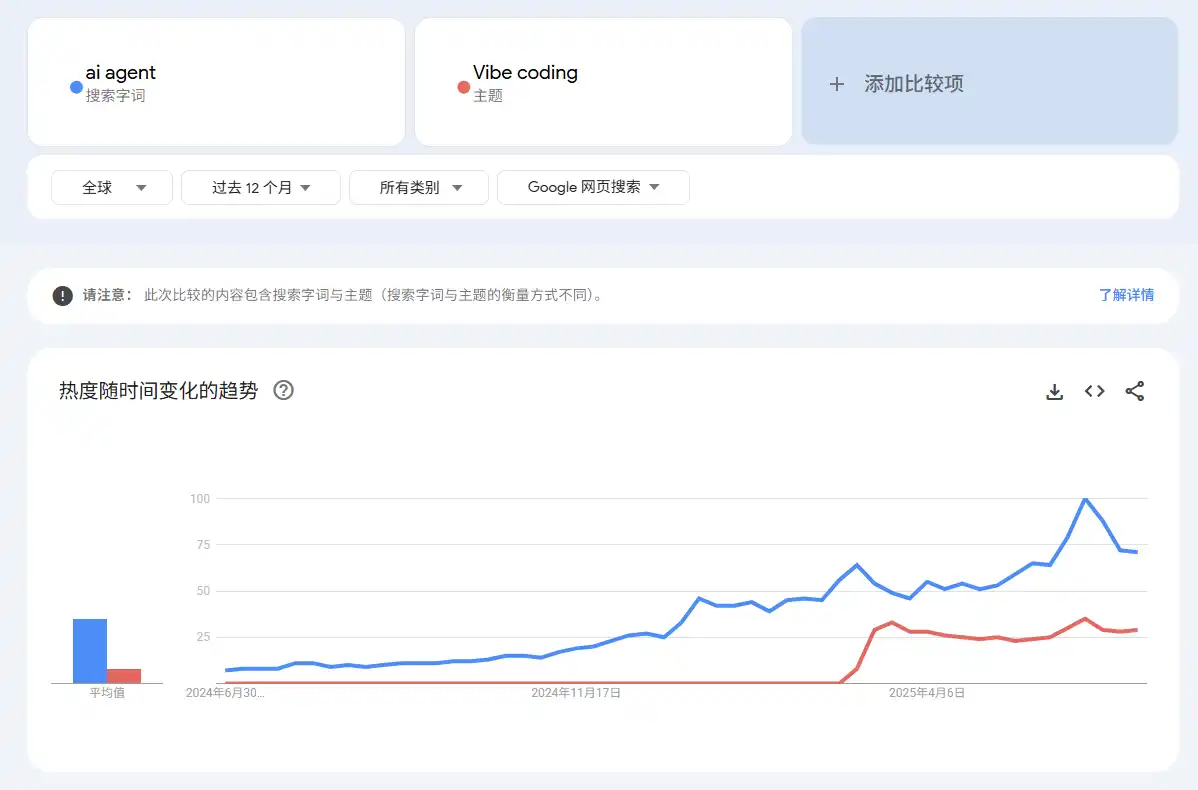
From the perspective of actual user perception, it may be challenging for the vibe coding concept to combine narrative elements to create a refreshing and groundbreaking experience for users, similar to the previous AI memes or the AI Agent period's aixbt. If the vibe coding concept is to explode, a more likely route is the discovery of platform value brought about by rising prices, similar to the various Launchpads that were popular during the AI Agent period.
Compared to AI Agents, vibe coding excels in its "newness." Its narrative has just begun to gain popularity in the Web2 space, while the concept of AI Agents took a considerable amount of time to build momentum from its inception to its rise and then to the big market in the crypto space. It is also easy to understand: "even those who do not understand programming can create programs to make money." At the same time, it is unlikely to enter a "narrative fatigue period" that requires grounded exploration, as existing products can indeed produce results; it is just a matter of how complex and large the applications can evolve into over time.
If Bitcoin remains strong and this year's altcoin season arrives as expected, the vibe coding concept is likely to achieve a breakthrough.
免责声明:本文章仅代表作者个人观点,不代表本平台的立场和观点。本文章仅供信息分享,不构成对任何人的任何投资建议。用户与作者之间的任何争议,与本平台无关。如网页中刊载的文章或图片涉及侵权,请提供相关的权利证明和身份证明发送邮件到support@aicoin.com,本平台相关工作人员将会进行核查。




